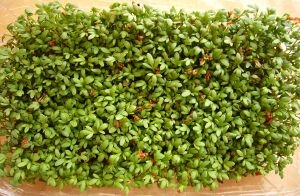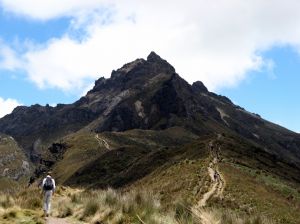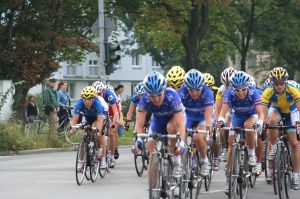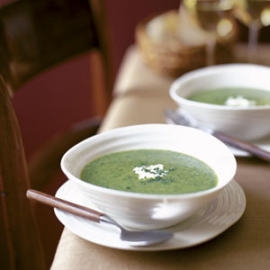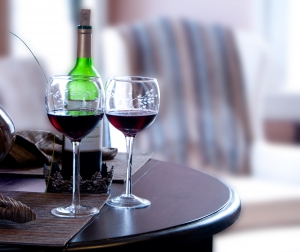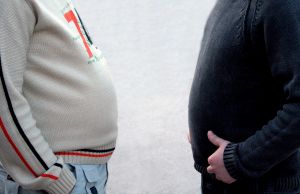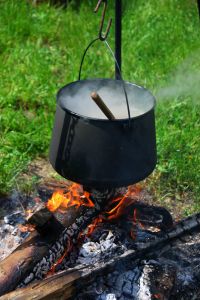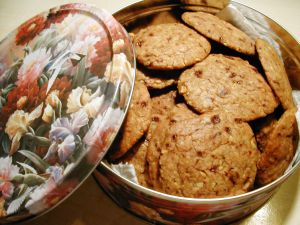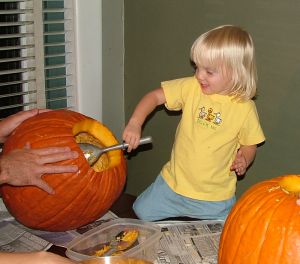Welcome to the September edition of the makeabigdifference newsletter, your one-stop-shop for all the latest charity and cancer news.
In this months newsletter we bring you the latest super food sweeping the nation. The humble Watercress is one of the most highly nutritious vegetables, with its health benefits attributed to its nutrient content. Gram for gram, watercress contains more vitamin C than oranges, more calcium than milk, and more iron than spinach. More relevant Watercress contains a chemical which can turn off a signal in the body which helps to starve cancer tumours of its blood and oxygen supply. Read our article ‘Beat cancer with nutrition’ to find out more and with the evenings getting colder now why not try our creamy watercress soup recipe?
Also in this months newsletter we have a spooktacular themed ‘Fundraising idea of the month’ with a whole host of Halloween fundraising ideas. Whether you are looking to host a Halloween charity ball, a pumpkin carving competition or sell bubbling hot soup from a cauldron, we have it all in this months article.
In the ‘Latest cancer news’ we share new insight into how alcohol is linked with breast and liver cancers as well as findings associating teenage BMI with future risks of cancer death in men.
Bev and Rob Law kindly share details of their recent visit to Helmsley and District Rotary Club where they were raising awareness about Young Heroes and the challenges faced by young people with cancer.
I was really sad to hear in the news about actor Andy Whitfield who passed away on 12th September following an 18 month battle with non-Hodgkin lymphoma. The 39 year old Welsh-born actor starred in numerous shows and movies but his biggest breakthrough was gladiator series ’Spartacus: Blood and Sand’. He was a very talented actor and was greatly respected amongst fellow actors and fans around the world.
Until next month,
Kim Doran
Editor
Thank you
Impact Young Heroes would like to thank John Morris and the Warwick Avon Rotary Club for their extremely kind donation of £100.00.
It is an honour that you choose to support our charity and that you are able to help us to support young people who are living with cancer.
Sports Challenge 2011/2012
As part of our summer fundraising drive we are asking supporters up and the country to take part in a range of events and activities to help us raise precious funds for young people affected by cancer.
Each month we will hand pick a selection of sporting events; so whether you are a beginner, seasoned athlete or general thrill-seeker there is an event for you.
What? Avenue of the Volcanoes 2012
Arriving in the multi-ethnic city of Quito you will kick off this fantastic challenge with a visit to the equator line before heading for the nearby volcanoes to start your trek.
Your challenge in the spectacular Avenue of Volcanoes begins with Pasochoa and El Corazon volcanoes, followed by Iliniza and culminates one of the world’s highest active volcanoes, the magical Mt. Cotopaxi.
When? 12th October 2012 – 22nd October 2012
Where? Ecuador
Closing date? ASAP to avoid disappointment
For further information: Call 020 8557 0000 or book online at: www.charitychallenge.com
What? Edinburgh to Dublin Bike Ride
This long weekend charity cycle challenge sees us cover just over 220 miles in 3 days, as we cycle from the capital of Scotland, to the capital of Ireland!
When? 17th May 2012 – 20th May 2012
Where? Edinburgh
Closing date? ASAP to avoid disappointment
For further information: Call 01244 676454 or book online at www.globaladventurechallenges.com
What? North Pole Challenge
Take part in this once in a lifetime trip to the North Pole. You will ski and sledge for around 8 hours per day, in the process encountering many challenges and breathtaking scenery.
When? 3rd April 2012 – 17th April 2012
Where? North Pole
Closing date? ASAP to avoid disappointment
For further information: Call 020 8557 0000 or book online at www.charitychallenge.com
What? Abseiling
Abseiling! decending a rock face using ropes, harness’s and helmets, your in safe hands as your instructor will be hold of you on a safety line so your not on your own. Come and try it out, all equipment supplied plus great instruction from one of our experienced and fun instructors.
When? 15th October 2011
Where? Rivington, Lancashire
Closing date? ASAP to avoid disappointment
For further information: Call 01257 474467 or book online at info@adventure21.co.uk.
Beat cancer with nutrition
~Watercress~
Watercress is often placed to the side of a plate as a decorative garnish, but it has been revered for its health properties for centuries.
The father of medicine, Hippocrates, is believed to have located his first hospital close to a freshwater stream to have a ready supply of the plant, while 17th Century herbalist Culpeper claimed it could cleanse the blood. It was used to ‘cure’ ailments such as baldness, hiccups and even freckles.
While these health claims may be debatable, watercress is packed with 15 essential vitamins and minerals. Now, scientists believe a daily dose may help combat breast cancer.
Last year, researchers at Southampton University discovered that within hours of eating 3oz of watercress a day – about a full cereal bowl – a small group of breast cancer survivors had a higher level of cancer-fighting molecules in their blood.
They found the compound phenethyl isothiocyanate – which gives watercress its peppery taste – blocks the hypoxia-inducible factor protein which helps cancer tumours grow.
They also found watercress helps ‘turn off’ the signals that cancer cells send out asking the body for more blood and oxygen.
Professor Graham Packham, who led the research, said: ‘I was surprised that eating one portion produced significant levels of this compound in the blood. It has the potential to have the same effect with other cancers.’
In fact, this is not the first time watercress – whose Latin name means ‘nose-twister’ – has been found to combat cancer.
In 2007, Irish scientists revealed that a daily portion reduced DNA damage to blood cells, considered an important trigger in the development of cancer.
The trial involved 60 healthy men and women who ate 3oz of fresh watercress every day for eight weeks. They found that in addition to reducing DNA damage, the cress also increased the ability of cells to resist damage from free radicals.
But its cancer-preventative properties are not the only benefit. ‘Watercress is full of nutrients including iron, calcium and Vitamin A and C,’ says dietician Katie Peck. ‘It is low in sodium and high in water, so it is very low in calories.’
It is an excellent source of natural phytonutrients, substances in plants that have antioxidant properties such as isothiocyanates, flavonoids and carotenoids.
It also contains folate, which helps maintain normal blood levels of homocysteine (high levels are associated with an increased coronary heart disease risk) as well as decreasing the risk of neural tube defects such as spina bifida.
Consultant dietician Sian Porter says: ‘Watercress also contains lutein, a carotenoid which is a plant component that provides the deep orange, yellow and red colours in fruit and vegetables. They have a role in helping to stay healthy and keep heart disease, cancer and macular degeneration at bay.’
Sourced from: http://www.dailymail.co.uk/health
Creamy watercress soup
Ingredients
- 450g/1lb leeks (white part only) washed and chopped
- 2 bunches watercress, washed, trimmed, destalked and chopped
- 2 medium potatoes, peeled and chopped
- 55g/2oz butter
- 840ml/30floz vegetable stock
- 150ml/5floz double cream
- Salt and freshly milled black pepper
- Watercress sprigs to garnish
(Serves 4-6)
Instructions
- Melt the butter in a heavy saucepan. Add the prepared leeks, potato and watercress and stir well.
- Add a good pinch of salt, then cover the pan and allow the vegetables to sweat over a low heat for about 20 minutes, stirring occasionally.
- Add the stock, bring to simmering point, cover and simmer for a further 10-15 minutes until the vegetables are quite tender.
- Remove from the heat and allow to cool.
- Liquidise the cooled soup and then return to the saucepan.
- Stir in the cream, season to taste and reheat gently.
- Serve garnished with a sprig of watercress.
New insight into how alcohol is linked to breast and liver cancers
A US laboratory study has revealed how the breakdown of alcohol in human cells results in DNA damage that causes cell changes linked to cancer.
The study shows how researchers are homing in on the way alcohol is linked to several cancers, particularly breast and liver cancers.
Published in Alcoholism: Clinical & Experimental Research, the new research shows that when alcohol – specifically ethanol – is converted inside cells into a chemical called acetaldehyde, the resulting DNA damage triggers a collection of proteins known as the ‘FA-BRCA network’ to respond and coordinate DNA repair.
In the human body, the FA-BRCA network seems to be particularly important in protecting against breast cancer.
The research team used human cells engineered to produce an enzyme called alcohol dehydrogenase 1B (ADH1B) – which is found in liver and breast tissue – and exposed them to a concentration of alcohol designed to be similar to blood alcohol levels attained during social drinking.
The results confirmed that the ethanol was being converted to acetaldehyde, causing DNA damage and switching on the cell’s DNA repair genes.
Study author Philip J Brooks, metabolism and health effects programme director at the National Institute on Alcohol Abuse and Alcoholism, said: “Although the link between drinking alcohol and certain types of cancers was first established in the 1980s the existence of such a relationship did not prove that alcohol itself caused the cancers.
“More recent evidence, however, has confirmed that alcohol – or more specifically, ethanol – is carcinogenic to humans at several sites in the body.”
Of the new study, Dr Brooks said: “We found that the cells converted the alcohol into acetaldehyde, and that this resulted in increased levels of acetaldehyde-DNA damage.
“In addition, the cells responded by activating the FA-BRCA network, as measured by two different methods.”
“Based on our research as well as more recent findings, it seems likely that the relationship between alcohol metabolism, the FA-BRCA network, and human health will become an increasingly important area of investigation in the future,” he said.
The authors added: “While our work is consistent with a role for acetaldehyde in alcohol-related liver and breast cancer, more studies in animals and humans will be necessary to prove such a role.”
Oliver Childs, senior science information officer at Cancer Research UK, said: “We’ve known for some time that alcohol is linked to several cancers, and it’s likely that it causes different types of cancer in different ways.
“This work takes us a step closer to understanding one of the ways in which alcohol contributes to the development of breast and liver cancers – it will be interesting to see if this lab work translates into studies in people.”
Sourced from: http://info.cancerresearchuk.org/news
Young Heroes Text Donation Service
Don’t forget you can now donate to Impact Young Heroes via a simple text message, here’s how it works;
1) Write one of the following text codes into the main body of your text
MABD01 £1 (use this code will donate £1 to Young Heroes)
MABD01 £2 (use this code will donate £2 to Young Heroes)
MABD01 £3 (use this code will donate £3 to Young Heroes)
MABD01 £4 (use this code will donate £4 to Young Heroes)
MABD01 £5 (use this code will donate £4 to Young Heroes)
MABD01 £10 (use this code to donate £10 to Young Heroes)
Our charity’s code and the amount you wish to donate.
2) Send a text to 70070
Include your charity’s code and an amount (for example CHAR17 £10)
3) You’ll receive a text with a link
to a Gift Aid form.
If you’re a UK tax payer, your charity benefits from a 25% boost to your donation
Why use TextGiving?
1) The charity gets every penny
This is a free service so no admin fees are taken
2) It’s free to take part
All text messages are free on all networks (except for the cost of the donation sent)
3) Easy and quick
Simply send a text and give up to £10 using your Impact Young Heroes unique six-digit code.
Please support us by using our text donation service.
Teenage BMI ‘associated with future risk of cancer death in men’
Men who are overweight at age 18 may be more likely to die from cancer in later life than those who are a healthy weight in early adulthood, UK and US scientists have found.
Researchers from the Medical Research Council, University College London and Harvard School of Public Health spotted the link after looking at the medical records of 19,593 men, all of whom attended Harvard between 1916 and 1950 and had enrolled in the Harvard Alumni Health Study.
They found that men with the highest body mass indexes (BMIs) – a measure of obesity – at age 18 were 35 per cent more likely to die from cancer than those with the lowest BMIs.
The researchers also looked at specific cancer types and found an association between weight at age 18 and risk of dying from lung, skin, oesophagus and kidney cancers.
Medical Research Council researcher Dr Linsay Gray, lead author of the study, which is published in the Annals of Oncology, said: “This is the first time the impact of obesity in early adulthood on later risk of cancer has been so closely examined. It is very interesting that higher BMI at age 18 actually leads to a greater risk for cancer than higher BMI in middle age.
“The message here is really clear: keeping your weight healthy as a young adult can significantly reduce your chance of developing cancer. These findings point worryingly to a greater future burden of cancer.”
Lead scientist Professor David Batty, Wellcome Trust fellow at UCL, added: “Investigating the influence, if any, of obesity in late adolescence and early adulthood on future cancer risk requires studies that have the capacity to track individuals over many decades until they develop cancer.
“Because such studies are so rare, our results make an important contribution to the field.”
Jessica Harris, Cancer Research UK’s senior health information officer, said: “Decades of research have shown that being overweight leads to a higher risk of several types of cancer.
“This new study has some limitations, like not being able to account for other things that affect cancer risk, but it did show that overweight people are more likely to die from certain cancers. Scientists estimate that in the UK, the current number of people who are overweight and obese could lead to around 19,000 cases of cancer a year, so keeping a healthy weight is a great way to reduce the risk.”
Sourced from: http://info.cancerresearchuk.org/news
On Monday 15th August 2011, Robert and I were invited to speak at Helmsley and District Rotary Club. We were made very welcome and following a lovely supper where we shared stories and heard about the work Rotary were undertaking in Tanzania with an isolated community, providing hospital and vital equipment for the people there, we were able to speak about the work of Impact Young Heroes and the holistic approach the charity undertakes in supporting young people and their families/carers. The Club kindly donated £25, and one of the members also gave a personal donation. When we carry out the task of speaking to groups, the Young Heroes ask us to ‘tell the public’ what impact, dealing with cancer has on their lives.
Having a life threatening illness as a teenager or young person is unique compared to any other age group. We informed the group about the experiences that our Young Heroes have shared with us, some of which include the interference with studies, employment, peer groups, fertility, body image, loss of limbs, and for future issues, such as being able to gain a life insurance policy or mortgage, let alone holiday insurance, something essential to enable safe travelling. Other issues include something as basic as getting into a night club, when you are stumbling due to pain in your limbs and the authorities think you are drunk; or hair loss which can result in similar problems. TRUE, I have witnessed this happening.
We always begin our talks with “We are aware this is a very sensitive issue, as each and every one of us will know of someone who has been affected by cancer and experienced the impact of this illness”. I believe that though this can be very painful, it creates an empathetic understanding of some of the issues the young people face.
Only today, as I am writing this article, have I been speaking to a Young Hero I support, about the death of two of her friends. One who became ill and died within the space of six weeks from the diagnosis of a brain tumour, and one who had died from the same condition as herself, Hodgkin’s disease. We shared about the impact of not only having to deal with the issues of friends losing their battle with the disease, but the young person having to face their own mortality when life should be exciting and a whole world of opportunities ahead of them.
So many of our Young Heroes tell us that when they have completed their treatments, that their world continues to be full of uncertainty, with repeated investigations ensuring that they remain well and free from cancer. It isn’t as if they can just get on with their lives and forget what has happened and move on. Many of them do get on with their lives extremely well, but each time an illness ‘crops’ up, the uncertainty is there, and for some the reality is, that the cancer has returned, often with vengeance, stripping them of any future.
There are also the issues of the after effects of chemotherapy. Someone described this to me that it was like having their system flushed out with bleach! Chemotherapy leaves many serious problems and we have known young people to undergo surgery for new bladders, surgery on limbs, especially where blood vessels are damaged and tissue necrosis occurs causing severe damage to bone and surrounding tissues. One Young Hero told me she may have to have replacement hips and knee surgery.
In spite of all this, the Young people’s hope and positive attitude to life, (some say it makes them value life much more than if they hadn’t had cancer), inspires me, and makes Robert and I feel so privileged to meet them, and for the opportunity to support them and their families when needed. We have had so much fun; I could write some very funny stories and tell of wonderful anecdotes and experiences of my work as a Health Care Support Coordinator, and for Robert as a volunteer.
Fundraising idea of the month
Halloween
31st October 2011
Coming up with good Halloween Fundraisers is not difficult.
It’s one of those annual events that nearly everyone enjoys and is a perfect opportunity to raise money for Impact Young Heroes.
Halloween falls on the 31st of October and as we know is traditionally associated with witches, ghosts, vampires, monsters and pumpkins.
Halloween is perfect for anyone looking for large scale fundraising event ideas. You can also, however, use Halloween as a great excuse for some good fundraising ideas at school, the workplace or the social club.
Below are some really good Halloween Fundraisers guaranteed to deliver a top earner (and lots of fun)
Pumpkin Sale
Are you letting the local stores sell all the pumpkins?
Cut Young Heroes a slice of the action and hold a pumpkin sale the week before Halloween. Most people would rather buy when they know some of the money helps a charity.
Team up with a supplier or wholesaler and split the profits. Alternatively offer a supplier a pitch at your workplace or school for an agreed price.
You might also be able to sell ready carved pumpkins to local businesses, shops, bars and restaurants for their window displays.
Halloween Hot Soup
Make up some delicious hot soup – nice and spicy is best. If you have a cauldron so much the better. Dress up as witches and sell it to friends, work-colleagues or passers-by.
This works brilliantly in staff canteens if you can get the support of your firm’s caterers.
Goblin Cookies
Halloween fundraisers do not have to be complicated.
Who amongst your colleagues could resist a special Homemade Halloween Biscuit delivered to their desk?
Tricks or Treats
Offer your colleagues a choice of Lucky Dip Bags.
Some contain a treat such as a chocolate bar – others tricks such as an onion, a carrot, a stone with a plastic spider tied to it etc.
Pumpkin Pandemonium
Easily combined with any other Halloween fundraisers you had going on or could be a “stand alone” event.
Who can come up with the best Jack o’ Lantern / Decorated Pumpkin?
Some might be carved in the traditional way but there are all sorts of other imaginative ways competitors might decorate them.
Put a bucket or cap by each pumpkin so people can vote for their top entry with loose change.
Could you even run the whole event in your town precinct or shopping mall? Guaranteed passing traffic and publicity for your cause.
Halloween Ball / Party
Ok really obvious but a great way to put on something just that bit different and stand out from all the other charity fundraisers. Dress your venue in scary black with ghoulish decorations. Have all your staff and volunteers in costume.
A fancy dress contest for your guests, great Halloween themed food and a few little competitions throughout the course of the evening. A perfect way to have fun and raise Young Heroes’ profile.

